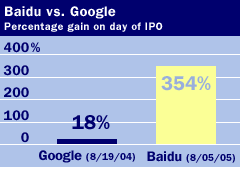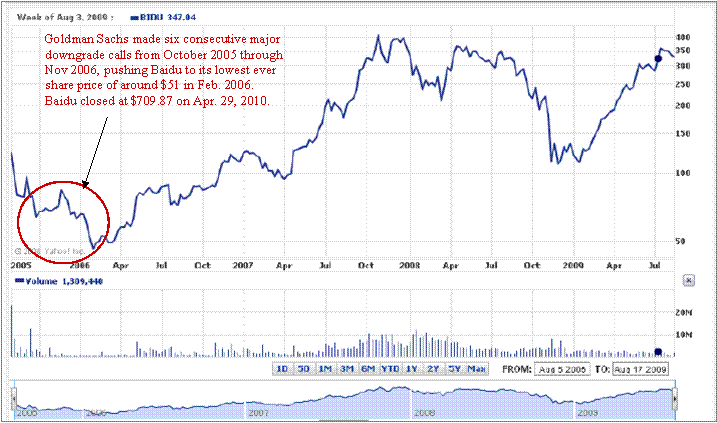Prosecutors Should Investigate Goldman Sachs on Baidu Trading
Companies / Market Manipulation Apr 30, 2010 - 09:15 AM GMTBy: Static_Chaos

 In light of the fact that Baidu stock is now valued at $700 instead of $27 asserted by Goldman Sachs as the “fair value” (by the way, Goldman has never been so wrong on price targets.), and the fact that Goldman actively trades against its clients, it is now high time for the U.S. federal prosecutors probe into Goldman’s trading practice of Baidu IPOs as well.
In light of the fact that Baidu stock is now valued at $700 instead of $27 asserted by Goldman Sachs as the “fair value” (by the way, Goldman has never been so wrong on price targets.), and the fact that Goldman actively trades against its clients, it is now high time for the U.S. federal prosecutors probe into Goldman’s trading practice of Baidu IPOs as well.
Goldman was one of the underwriters of Baidu's IPO in 2005. Goldman spent months promoting the Baidu stocks to investors; however, they did not understand the value of Baidu being the Google of China, and most likely betted against their client--Baidu.
The following is an updated version of my original article on Goldman and Baidu, which should lead to only one probable conclusion-- With Baidu IPOs being a phenomenal success, Goldman needed to orchestrate a public statement to quickly reverse their losing positions, and probably committed fraud in order to save their behind.
Much has been said about Goldman Sachs (GS) by articles like Mr. Matt Taibbi July 2, 2009 Rolling Stone “Inside the Great American Bubble Machine”. But most have not heard about Goldman Sachs' involvement in the initial public offering (IPO) of Baidu (BIDU) and the subsequent BIDU share price movements back in 2005 and 2006.
Goldman Sachs and Piper Jaffray (PJC), along with Credit Suisse First Boston (CS), underwrote Baidu's IPO. The IPO would be the first for a pure-play Chinese search engine company. Baidu American depositary shares (ADS) started trading on August 5, 2005. An initial 4.04 million ADSs were offered at $27 per ADS; opened at $66, more than double its $27 price, climbed, stabilized and then rallied anew before ending its historic opening day at $122.54.
With a rise of 354%, Baidu’s first-day gain ranks 18th in history and ranks as the best performance ever by an overseas deal. At its IPO price of $27 a share, the company raised $109 million. Part of the big debut-day move from Baidu.com can be traced to the relatively small size of the deal.
 With only 4.04 million shares in the IPO and strong indications of interest from both retail and institutional investors, demand had driven up the price throughout the process. The widely circulated rumor at the time that Google (GOOG) had attempted to buy the firm fueled interest in the stock and gave investors confidence in it as well.
With only 4.04 million shares in the IPO and strong indications of interest from both retail and institutional investors, demand had driven up the price throughout the process. The widely circulated rumor at the time that Google (GOOG) had attempted to buy the firm fueled interest in the stock and gave investors confidence in it as well.
Typically, underwriters would only be overjoyed when a stock they took IPO shot up like this in its debut. But the course of action Goldman and Piper Jaffrey took next was totally unprecedented and completely out of character for investment bankers.
Forty days after Baidu went public, the minimum period before an underwriting firm can release an analyst report, on Sep. 14, 2005, at 6:00 am before the market opened, Goldman Sachs and Piper Jaffray, two of Baidu’s underwriters, issued a joint statement that rated the company stock as “underperform”. Goldman even went so far as to say that the company is worth exactly $27 a share, which is the same as its IPO price.
Anthony Noto, the Goldman analyst, also said that “at the most extreme”, Baidu could be worth $45 a share. At the Piper Jaffray camp, $45 was also cited as the price target on the stock -- a mark, Safa Rashtchy, the analyst at Piper Jaffray said, that includes “an aggressive valuation premium”. Shares of Baidu closed at $113 the day before, and it had been as high as $153.
At the time, media touted Goldman’s unusual move as a welcoming sign that analysts and investment banks were moving away from rubber-stamping clients stocks. Investment banks normally wouldn't have been so harsh on a recent IPO, fearing it might get left out of future lucrative banking deals. In the 1999 and 2000 heyday, only 3% of IPOs were initiated with a "hold" or lower rating after the IPO.
According to Taibbi, Goldman's bankers used techniques called "laddering" and “spinning”. In laddering, an investment bank would allot IPO shares to institutional investors who promised to buy more once trading in the new firm began. There is also ‘spinning” where the investment bank would offer a chosen few the newly public company shares at extra-low prices, in exchange for future underwriting business.
Banks that engaged in spinning would then undervalue the initial offering price — ensuring that those "hot" opening-price shares it had handed out would be more likely to rise quickly, supplying bigger first day rewards for the “insiders”. Now, don't they sound eerily familiar in the case of Baidu’s IPO?
BIDU dropped 29% to $81.05 by Oct 26, 2005. Goldman then subsequently made five consecutive major downgrade calls from October 2005 through Nov 2006. However, Baidu only reached its lowest ever share price of around $51 in Feb. 2006. Despite four more Goldman downgrades from Feb. to Nov 2006, Baidu shares went up to $117 by Dec. 15, 2006.

Up till May 2006, Goldman was still saying Baidu shares at $65 were 10% overvalued. True to the old saying “If you can’t beat them, join them.”, in Dec. 2006, Goldman raised Baidu target price to $128, only about one year after the conspicuous joint press conference with Piper Jaffray, where Goldman named an exact $27 as fair price on Baidu.
So, at this point, anyone would be highly suspicious of this suddenly emerged “objectivity” of BIDU`s fair value. One could only draw the conclusion: it was to Goldman’s benefits to push down the share price of Baidu. There are three possible scenarios:
(1) Goldman did not do its homework and seriously undervalued Baidu; therefore, the 6:00 am press conference could be meant to save face and avoid potential law suits from Baidu. Baidu and Goldman were reportedly far apart on valuation. Baidu was looking for a market cap of $1 billion, and Goldman, suggested around a third of that.
(2) Between the laddering and spinning, Baidu shares probably went up too high, too quickly for Goldman and its insiders to profit. So, at that point, the only way Goldman could have rectified the situation expeditiously was to issue a major downgrade immediately after the 40-day lockout period.
(3) The growth momentum of the Internet run in China had and still has room to expand, and is expected to accelerate on the heels of strong user base expansion and increased utilization. Goldman, who spent all this time, energy and money doing road shows, knew the true value of Baidu, judging by the $128 target price about one year after the “objective” $27 valuation, could be trying to accumulate positions.
Among all the things in which Goldman has allegedly been involved or under investigations by regulatory authorities, this little anomaly has never caught any publicity or scrutiny, mostly because Baidu just went about its business as usual without escalating it into a public fiasco, which has been Baidu’s management style. In addition, Baidu was an overseas start-up company, hence probably under most major media’s radar screen.
To Baidu’s credit, the company’s sound performance and strong market fundamentals have propelled its shares from the low point of around $51 back in Feb. 2006 to a high of about $409 the week of Oct. 29, 2007. BIDU closed at almost $709.87 on Thursday, April 29, 2010.
So, there you have it – another possible explanation of how Goldman could afford to pay out record bonuses every year – they seem to play by a different set of rules. Goldman Sachs’ powerful political and financial connections apparently have insulated it from regulators whose job is to maintain fair and balanced markets. However, when Goldman Sachs is involved – fair and balanced appears to have taken on an entirely new connotation.
By Static Chaos
http://static-chaos.blogspot.com
© 2010 Copyright Statoc Chaos- All Rights Reserved
Disclaimer: The above is a matter of opinion provided for general information purposes only and is not intended as investment advice. Information and analysis above are derived from sources and utilising methods believed to be reliable, but we cannot accept responsibility for any losses you may incur as a result of this analysis. Individuals should consult with their personal financial advisors.
© 2005-2022 http://www.MarketOracle.co.uk - The Market Oracle is a FREE Daily Financial Markets Analysis & Forecasting online publication.


